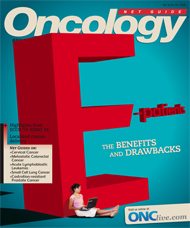Publication
Article
ONCNG Oncology
Danger on the Web: Promotion of Unregulated Stem Cell Clinics
Author(s):
The increasingly important role of the Internet in disseminating health-related information to patients and the general public has been described in several publications and is the topic of this month's cover story.
The increasingly important role of the Internet in disseminating health-related information to patients and the general public has been described in several publications and is the topic of this month’s cover story. While there is no doubt that high-quality information can be provided through this medium, including general information (eg, “what is breast cancer?”) and more specific information (eg, “what is the efficacy of a particular combination chemotherapy regimen in treating advanced breast cancer?”), content posted online is largely unregulated, facilitating the widespread promotion of a large variety of unproven and potentially dangerous products.
Flashy pronouncements and testimonials describing major benefit (“cure”) without any toxicity for serious medical conditions has as much credibility on the Web as a straightforward objective report published in the peer-reviewed literature that outlines small improvements in outcomes associated with a 1000+ patient randomized phase III trial. Further, the fl ashy pronouncements may be especially appealing to desperate patients who are told by their physicians that no effective therapy is currently available to treat their condition.
A more recent development in the realm of medical quackery that Oncology Net Guide readers should be aware of is the presence of non-US-based clinics offering treatment with stem cell products. While the biology supporting a potential role for stem cells (embryonic or adult) is extremely interesting and could theoretically treat a number of difficult illnesses, the clinical application of this strategy as a valid therapy remains in its infancy. There is currently no evidence that delivery of human stem cells is an effective treatment approach for any condition, except to preserve bone marrow or peripheral precursor cells following high-dose systemic chemotherapy. Despite this, there are currently more than a dozen known Websites that proclaim documented benefits with stem cell administration in a number of diseases, with minimal (if any) associated side effects.1 The advertised costs of stem cell therapy are in the $20,000 to $25,000 range, but clinics in China have charged as much as $70,000 for such treatments.
While current experience with non-regulated stem cell therapies has focused on management of neurological conditions, such as multiple sclerosis, it is only a matter of time before unsubstantiated claims will be made indicating a favorable impact with this therapy on the clinical course of one or more malignant diseases. While the impact of stem cells in the oncology setting is unclear, infusion of these biological products has the potential for causing serious harm. A report recently published in PLoS Medicine documented the development of a malignant brain tumor following the delivery of fetal stem cells to a patient with ataxia telangiectasia.2 The patient had traveled to Russia from Israel to receive this cellular preparation via the intrathecal and intracerebellar routes, and was subsequently found to have a tumor with cells that were documented to be of donor origin.
It is understandable that desperate patients and their families may elect to pursue a wide variety of unproven alternative strategies, including stem cell infusions, especially when conventional medical approaches are unable to relieve distressing symptoms or death appears imminent. Realistically, oncologists can only play an advisory role if their patients elect to participate in such programs; however, offering information on the current lack of documented benefit associated with stem cell treatments, and, most importantly, discussing objective evidence for possible harm, may allow oncologists to provide a critically-relevant counterbalance to invalid and potentially dangerous Internet claims.
Maurie Markman, MD, is Editor-in-Chief of Oncology Net Guide and Vice President of Clinical Research for University of Texas MD Anderson Cancer Center in Houston, Texas.
References
1. Barclay E. Stem-cell experts raise concerns about medical tourism. Lancet. 2009;373(9667):883-884. No abstract available.
2. Amariglio N, Hirshberg A, Scheithauer BW, et al. Donor-derived brain tumor following neural stem cell transplantation in an ataxia telangiectasia patient. PLoS Medicine. 2009;6(2):221-231. Abstract available at: http://tinyurl.com/yhr8jww.
